Madonna appears on the cover of Vanity Fair for the 10th time, posing for photographer and longtime collaborator Steven Meisel for V.F.’s third annual Green Issue. The inspiration for the cover image (Madonna holding up a custom-made globe of the world measuring four feet in diameter) came from the cover of a mid-century fashion magazine and the 1920s work of Czech photographer Frantisek Drtikol.
Madonna tells Vanity Fair contributing editor Rich Cohen that in high school, 'I was one of those people that people were mean to.' She continues, 'I wasn’t a hippie or a stoner, so I ended up being the weirdo. I was interested in classical ballet and music, and the kids were quite mean if you were different....'
'When that happened, instead of being a doormat, I decided to emphasize my differences. I didn’t shave my legs. I had hair growing under my arms. I refused to wear makeup, or fit the ideal of what a conventionally pretty girl would look like. So of course I was tortured even more, and that further validated my superiority, and helped me to survive and say, ‘I’m getting out of here, and everyone is a heathen in this school—you don’t even know who Mahler is!'
Madonna draws on the same kinds of survival skills today when it comes to dealing with all of the media attention, telling Cohen, 'You have to get to a point where you care as little about getting smoke blown up your ass as you do when you become a whipping boy in the press, because ultimately they both add up to shit. You just have to keep doing your work, and hope and pray somebody’s dialing into your frequency. If your joy is derived from what society thinks of you, you’re always going to be disappointed.'
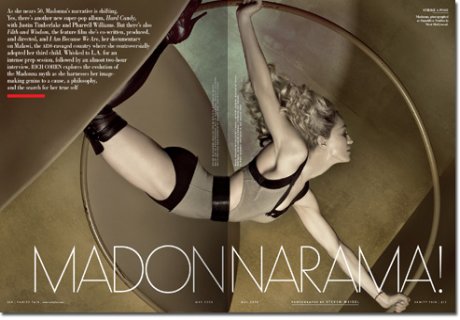
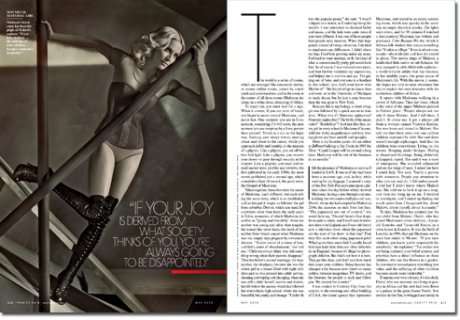
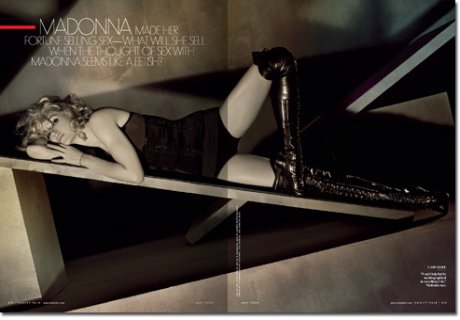
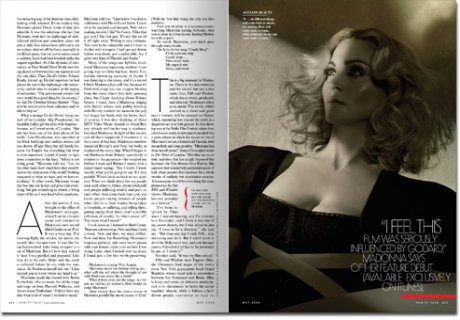
Madonna speaks on a range of topics, including:
BRITNEY SPEARS:
'Yes, I know. I know exactly what you’re going to say. It’s very painful. Which leads us back to our question: When you think about the way people treat each other in Africa, about witchcraft and people inflicting cruelty and pain on each other, then come back here and, you know, people taking pictures of people when they’re in their homes, being taken to hospitals, or suffering, and selling them, getting energy from them, that’s a terrible infliction of cruelty. So who’s worse off? You know what I mean?'
THE PAPARAZZI:
'The paparazzi are out of control. I haven’t been to Los Angeles in quite a while, and I don’t watch television here or in England, and I was told there’s now a television show where the paparazzi are the stars of the show—is that true? That they film each other doing paparazzi jobs? Which gives them more fuel. I usually found that type kept their distance—they definitely do in England, because it’s illegal to photograph children. But that’s not how it is here. They get this close, and don’t care how much they scare your children.'
'Being famous has changed a lot, because now there’s so many outlets, between magazines, TV shows, and the Internet, for people to stalk and follow you. We created the monster.'
WRITING AND DIRECTING HER FIRST FILM:
'I’ve been inspired by films since I started dancing, and I’m married to a filmmaker, and I think it was one of my secret desires, but I was afraid to just say, ‘I want to be a director.’ But then one day I said, O.K., stop dreaming and do it. But I didn’t want to do it the Hollywood way, and talk through agents. I decided it all had to be generated by me, so I wrote it....It was my film school.'
HOW NEW YORK HAS CHANGED:
'It’s not the exciting place it used to be. It still has great energy; I still put my finger in the socket. But it doesn’t feel alive, cracking with that synergy between the art world and music world and fashion world that was happening in the 80s. A lot of people died.'
THE MUSIC BUSINESS:
'Well, there’s one thing you can’t download and that’s a live performance. And I know how to put on a show, and enjoy performing, and I’ll always have that.'
HER LONG CAREER:
'Honestly, it’s not something I sit around ruminating about. Who is my role model and how long can I keep this going? I just move around and do different things and come back to music, try making films and come back to music, write children’s books and come back to music.'
HOW HER MOVIES ARE DIFFERENT FROM HER HUSBAND, GUY RITCHIE’S:
'We make different kinds of movies. I don’t have the technical knowledge he has. He’s got a vision, and his films are very testosterone-fueled. Mine are much more from a female point of view, and I can’t help but be autobiographical in everything I do.'
HOW HAVING CHILDREN CHANGES YOU:
'If you have children, you know you’re responsible for somebody. You realize you are being imitated; your belief systems and priorities have a direct influence on these children, who are like flowers in a garden. So you start to second-guess everything you value, and the suffering of other children becomes much more intolerable.'
HER FAVORITE CHILDREN’S BOOKS:
'Winnie the Pooh, Pippi Longstocking, Horrid Henry.'
THE LOSS OF HER MOTHER [AT AGE SIX]:
'You’re aware of a sense of loss, and feel a sense of abandonment. Children always think they did something wrong when their parents disappear.'
The May issue of Vanity Fair hits newsstands in New York and Los Angeles on April 2 and nationally on April 8.
You can read the full interview online at www.vanityfair.com/culture/features
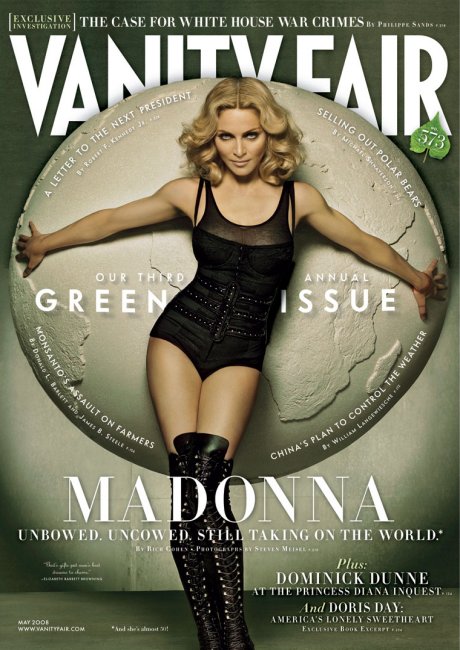
All Pictures: Steven Meisel exclusively for Vanity Fair.
Thanks to Elizabeth at Vanity Fair


No comments:
Post a Comment